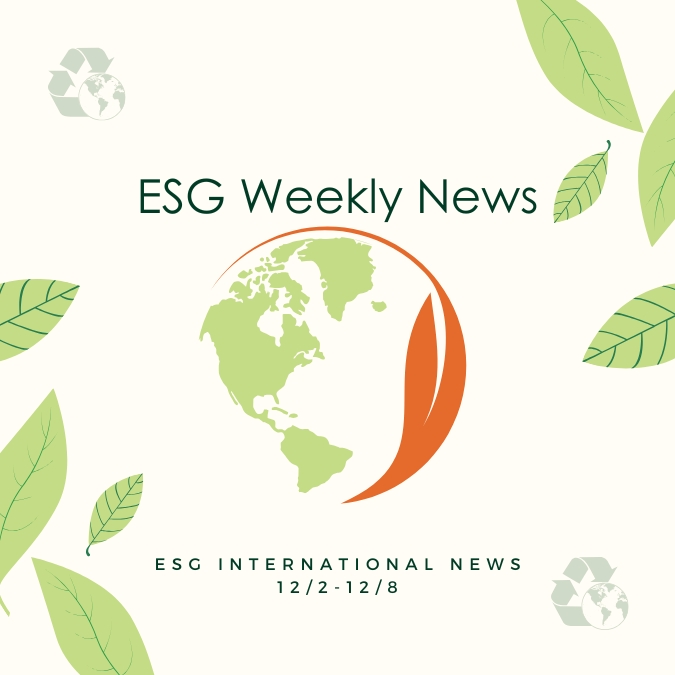- Home
- News
- ESG Weekly News
- ESG International Weekly News 12/2 - 12/8
ESG International Weekly News 12/2 - 12/8

1.Texas Launches Multi-State Lawsuit Accusing BlackRock, Vanguard, State Street of Using ESG Investing to Manipulate Energy Markets
德州發起多州訴訟,指控貝萊德、先鋒和道富利用ESG投資操縱能源市場
Texas Attorney General Ken Paxton and 10 other states filed a lawsuit against BlackRock, Vanguard, and State Street, accusing them of using their influence to reduce coal production through climate-focused initiatives, allegedly driving up energy costs. The suit claims violations of federal and state antitrust laws and deceptive trade practices, focusing on their large holdings in major coal companies and coordination through initiatives like the Net Zero Asset Managers Initiative. Despite the asset managers’ withdrawal from some climate initiatives, the lawsuit alleges ongoing anti-competitive practices. The firms dismissed the claims as baseless, emphasizing their focus on client interests and financial returns.
德州檢察長肯·帕克斯頓與其他10個州對貝萊德(BlackRock)、先鋒(Vanguard)及道富(State Street)提起訴訟,指控這些公司利用其影響力透過氣候相關投資計畫壓縮煤炭產量,導致能源成本上升。訴訟指控其違反聯邦及州的反壟斷法與欺騙性商業行為法,特別強調這些公司在美國主要煤炭企業中的大量持股及其通過淨零資產管理人倡議(NZAM)等協調行動。儘管這些公司已退出部分氣候倡議,訴訟仍主張其反競爭行為持續存在。三家公司均否認指控,強調專注於客戶利益及財務回報。
2.Coca-Cola Scales Back Sustainable Packaging, Agriculture Goals
可口可樂縮減可持續包裝和農業目標
The Coca-Cola Company announced updated 2035 environmental goals, revising and delaying several targets, such as reducing its recycled materials goal from 50% by 2030 to 35-40% by 2035 and lowering its collection rate ambition to 70-75% by 2035. Coca-Cola also removed its refillable packaging and sustainable agriculture goals, shifting focus to infrastructure investment, recycled materials in packaging, and water usage in high-risk areas. The company replaced its prior emissions reduction target with one aligned to a 1.5°C trajectory but eliminated an absolute emissions goal. Coca-Cola emphasized collaborative efforts and efficient resource allocation to address environmental challenges effectively.
可口可樂公司宣布更新至2035年的環保目標,對部分目標進行修正並延後,包括將包裝材料中的回收材料目標從2030年的50%調整至2035年的35%-40%,以及降低回收率目標至70%-75%。同時,移除了可重複使用包裝及可持續農業相關目標,並將重點轉向基礎設施投資、包裝中使用回收材料以及高風險地區的水資源管理。公司也將2030年的碳排放絕對減量目標改為與1.5°C軌跡一致的新目標,但不再設定絕對減量數值。可口可樂強調需透過協作、有效資源分配及政策制定來應對環境挑戰,實現長期影響力。
3.Thailand Issues Inaugural $865 Million Sustainability-Linked Bond
泰國發行首支8.65億美元可持續掛鉤債券
Thailand completed its first Sustainability-Linked Bond (SLB), raising 30 billion baht (USD $865 million) with strong demand, oversubscribed by 2.8 times. The bonds, tied to Thailand's climate goals, aim for a 30% reduction in greenhouse gas emissions by 2030 and 440,000 annual zero-emission vehicle registrations by 2030. This is Asia’s first government-issued SLB and the third globally, reflecting renewed interest in a market that has faced scrutiny over target credibility. Thailand plans to issue a larger SLB worth 130 billion baht (USD $3.9 billion) in 2025.
泰國完成首支可持續掛鉤債券(SLB)發行,籌集300億泰銖(8.65億美元),需求強勁,超額認購2.8倍。該債券與泰國的氣候目標掛鉤,包括到2030年實現溫室氣體排放減少30%及每年新增44萬輛零排放乘用車登記。此為亞洲首支政府發行SLB,亦為全球第三支,顯示市場對該類債券的關注有所回升。泰國計劃於2025年發行規模達1300億泰銖(39億美元)的SLB。
4.EU Commission Commits €4.6 Billion to Support Cleantech Projects
歐盟委員會承諾46億歐元支持清潔技術項目
The European Commission announced a €4.6 billion investment in decarbonization technology and clean hydrogen projects, funded through the EU Emissions Trading System (EU ETS). This includes €3.2 billion for net-zero technologies, with €1 billion for electric vehicle battery manufacturing and €1.2 billion for renewable hydrogen production. The funding is part of the Innovation Fund, which supports Europe’s climate-neutral transition and net-zero industries. The EU aims to enhance competitiveness while reducing greenhouse gas emissions. The Commission also launched new criteria for resilience and strategic autonomy, focusing on supply chain independence, particularly for batteries and hydrogen.
歐洲委員會宣布將投入46億歐元,用於脫碳技術和清潔氫能項目,資金來自歐盟排放交易系統(EU ETS)。其中包括32億歐元用於淨零技術,1億歐元專門用於電動車電池製造,12億歐元用於加速可再生氫能的生產。這筆資金來自創新基金,旨在支持歐洲的氣候中立轉型和淨零產業發展。歐盟的目標是提升競爭力,同時減少溫室氣體排放。委員會還推出了新標準,強調供應鏈的韌性和戰略自主性,特別是在電池和氫能領域,減少對中國等國家的依賴。
